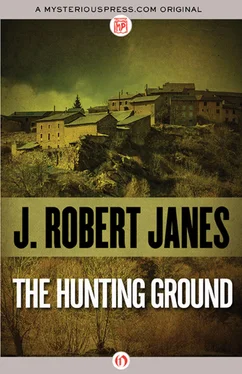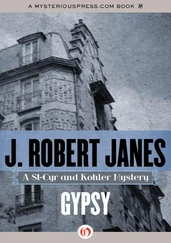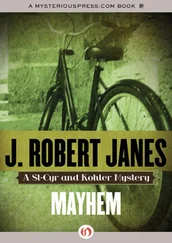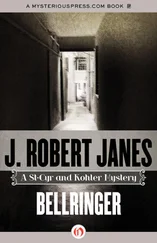J. Janes - Hunting Ground
Здесь есть возможность читать онлайн «J. Janes - Hunting Ground» весь текст электронной книги совершенно бесплатно (целиком полную версию без сокращений). В некоторых случаях можно слушать аудио, скачать через торрент в формате fb2 и присутствует краткое содержание. Год выпуска: 2013, ISBN: 2013, Издательство: MysteriousPress.com/Open Road, Жанр: Триллер, на английском языке. Описание произведения, (предисловие) а так же отзывы посетителей доступны на портале библиотеки ЛибКат.
- Название:Hunting Ground
- Автор:
- Издательство:MysteriousPress.com/Open Road
- Жанр:
- Год:2013
- ISBN:978-1-4804-0067-2
- Рейтинг книги:4 / 5. Голосов: 1
-
Избранное:Добавить в избранное
- Отзывы:
-
Ваша оценка:
- 80
- 1
- 2
- 3
- 4
- 5
Hunting Ground: краткое содержание, описание и аннотация
Предлагаем к чтению аннотацию, описание, краткое содержание или предисловие (зависит от того, что написал сам автор книги «Hunting Ground»). Если вы не нашли необходимую информацию о книге — напишите в комментариях, мы постараемся отыскать её.
Hunting Ground — читать онлайн бесплатно полную книгу (весь текст) целиком
Ниже представлен текст книги, разбитый по страницам. Система сохранения места последней прочитанной страницы, позволяет с удобством читать онлайн бесплатно книгу «Hunting Ground», без необходимости каждый раз заново искать на чём Вы остановились. Поставьте закладку, и сможете в любой момент перейти на страницу, на которой закончили чтение.
Интервал:
Закладка:
‘How long will you be here today?’
No argument about the children because there could be none, not in so far as he was concerned. ‘Until the last train. I … I didn’t bring anything with me.’ No diaphragm, no pessary. Nothing.
That train rushes on. That night closes in and I’m sitting here all alone, listening to the sound of the wheels. Now a gap between the rails, now the briefest of pauses, then another gap. Racing … always racing. Cows and farms, lights winking in the night, the barriers down at a crossing. No lights. None. The blackout …
Jules … and I’m remembering that hotel room of his, us standing naked beside the bed. My right arm rested over his shoulder, that hand not touching the hair at back of his neck, not yet. In uncertainty, I placed the palm of my left hand on his chest and felt the skin and its curly hairs, was a little sideways to him, for it was always best like this at first, and I constantly reminded myself that English women just jumped into bed and went at it hard, but I didn’t. I tried not to.
Hesitantly, we kissed. Lightly, timidly, I explored his lips as he did mine, he with his left hand on my seat and caressing it, smooth, so smooth and soft that skin.
Another kiss followed, still timidly, still exploratory, like first-time lovers-it must be that way, but then my other hand slid up into his hair, and I pulled him towards me, all passion, everything else forgotten.
We fell back on to that bed. I cried out to him, kissed him again and again, felt his kisses on my throat, my breasts.
Came like a rocket. Ah, how can I ever forgive myself? The tension of the day, the fear-that awful fear of knowing you might lose someone you love.
Jules thrust himself into me one last time, and I felt the throbbing, jerking, hammering of his lovely cock, and wrapped my arms and legs about him. Kissed him, hugged him, didn’t want to ever let go of him-ah, all those crazy things one thinks of at such a time.
Only then, as he raised himself up a little to look down at me, did I reach back under the pillow to lie languidly beneath him with love in my eyes.
There was an earring under the pillow, and I hid it in my fist because it wasn’t mine and I was too upset to confront him. A faceted citrine droplet that dangled from the end of a tiny length of silver chain, the links so delicate, the weave of them the work of great patience and skill.
Old but not that old. Edwardian perhaps. Victorian? The Moulin Rouge, the Alcazar, the Cirque Medrano? The 1920s? I wondered.
Winking in the half-light of that train, it stared up at me.
‘Madame … madame, forgive me for waking you, but there’s a call from Paris. An inspector from the Sûreté Nationale, a Gaétan Dupuis. They must have asked to have your call traced.’
I nod. I shake my head to clear it of its memories. ‘Has my nurse come back yet from her shopping?’
‘Only to leave a few parcels, to check on you and go out again.’
‘Good. Did this inspector ask for me by name?’
‘Ah, no, madame. He has simply asked if the caller was still here and if he could speak with you.’
‘You gave him no details?’
‘Of course not, madame.’
What is it about the sight of a telephone that terrifies? The instrument stands in judgement, the receiver lies as if wounded, and you know that the Gestapo will be listening.
Dupuis … the thinning hair, those mouse-brown eyes whose look could be so intense, the front tooth that was capped with gold, the nicotine stains.
‘ Allô? Oui, oui, c’est moi. Qu’est-ce que vous désirez, monsieur?’
That voice comes back to me. It’s like yesterday. I want to scream, to cry out and turn away from the blows. I want to vomit, but they’ve shoved me under again, and I can’t breathe in anything but water and must have air! They yanked me out but only at the last moment …
‘Madame, what is it?’ asks the manager.
‘Nothing! Nothing. Forgive me, please.’
I hear Dupuis breathing at the other end of the line. Paris, 11 rue des Saussaies, the offices of the Sûreté, those also of the Gestapo. The caller asks, ‘Madame, which camps were you in?’
I say it like a confession. I can’t stop myself. ‘Auschwitz and Bergen-Belsen.’
Dupuis sucks in a breath, and I see him holding it as they’ve thrown me to the floor and lifted me up to face him yet again. ‘What’s your name, please?’ he asks.
Please? Ah, nom de Jésus-Christ, what is this? ‘That I can’t tell you. I’m not the one you’ll be dealing with. I’ve only been asked to contact you people.’
‘Then there’s something you ought to know, madame. Our consciences are clean. We’ve been cleared by the Résistance. The matter’s been settled.’
‘ Ah, bon , Inspector, then you have nothing to worry about.’
‘Madame, I must tell you …’
‘Inspector, there’s nothing you or any of the others can tell me that I don’t already know. You’ve received your little black coffin. The post was good, n’est-ce pas ? You’ll get my instructions soon enough.’
I hang up. I stand there shaking so hard I can’t control myself and am afraid I’m going to piss, but then a hand gently touches my shoulder. Startled, I defiantly turn, but it’s only my nurse who says, ‘Madame, what have you done?’
‘Nothing! Can’t you see that I’ve done nothing!’
It’s exactly the answer I first gave them.
2
My refusal to discuss what happened today has put them all on edge. Even though there are grey spots on my lungs and the x-rays aren’t good, Dr. Zimmermann has asked that I think about leaving the clinic if I can’t put my total trust in them.
Dr. Morganfeld is more cautious. After all, he’s Jewish-the juice and diet man-one of the lucky ones who got out of Austria in 1937, so he has, understandably, a monstrous feeling of guilt to overcome.
Dr. Laurier is a woman whose grandparents lived in a little place called Oradure-sur-Glane until the Das Reich, the Second Panzer Division of the Waffen SS, came and destroyed everything. She’s been home to see it, is a specialist in such matters, the only psychiatrist at the clinic, but is still suffering to cope. It’s Dr. Laurier who has asked the others to allow me to decide what’s best for me and who has said, in the privacy of the corridor, ‘I’ll get you across the frontier if you wish.’
You see, I have no papers, and if you have no name, only a number, you haven’t got a chance.
‘Will you really do that for me?’
‘Yes, of course. I’ll ask to accompany you tomorrow on your trip into the mountains. I’ll simply say we talked it over and you decided not to come back.’
I think she knows whomever I telephoned will start to look for me, and that it would be best if I went into hiding.
‘I can let you have some money,’ she says. ‘Swiss francs. Good hard cash.’
‘You should have been with us, Doctor. We could have used you.’
‘It’s not going to be easy. Things have changed in France. There’s a terrible bitterness. Brother is now after brother.’
She’s so sensitive, she would never have made it through the camps. ‘Would you send this telegram to Dr. André de Verville, Apartment 7, 34 boulevard de Beauséjour, Paris? If you could do that after I’ve left the clinic, so much the better.’
I hand her the slip of paper on which is written, André, Michèle has asked that you remember how it was .
‘And the sender?’
She still hopes I’ll confide in her.
‘Put something down,’ she says. ‘It’ll be easier that way.’
More information. ‘Just sign it “Simone.” He’ll know who it’s from.’
Читать дальшеИнтервал:
Закладка:
Похожие книги на «Hunting Ground»
Представляем Вашему вниманию похожие книги на «Hunting Ground» списком для выбора. Мы отобрали схожую по названию и смыслу литературу в надежде предоставить читателям больше вариантов отыскать новые, интересные, ещё непрочитанные произведения.
Обсуждение, отзывы о книге «Hunting Ground» и просто собственные мнения читателей. Оставьте ваши комментарии, напишите, что Вы думаете о произведении, его смысле или главных героях. Укажите что конкретно понравилось, а что нет, и почему Вы так считаете.












